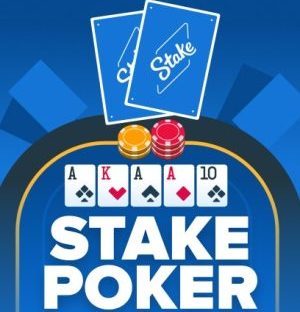Poker Game Theory Explained
Exactly what is poker game theory? Sure, if you're a student of poker, both US online Poker and live casino poker, you probably know what poker game theory is. If you're schooled in higher mathematical concepts, you also know. Sort of. But the plain fact is, most online poker players don't have a clue. Don't worry. Game theory is just a term you hear bandied about by poker nerds. Frankly, the term frightens most normal poker players, because it suggests that a few opponents know something they don't. Something powerful. Something sinister.
I haven't seen anyone show me a purely game-theory approach to any real-life US online poker game that could come anywhere near the profit potential of even common-sense poker. And nobody is likely to show me one for many years.

Stake.us Poker
And when someone does come up with a complete strategy for a given game, based on game theory, nobody will be able to apply it very successfully during the course of a game. You'd need a secret computer to quickly analyze which action to take when. The game that probably comes closest to being cracked by pure game-theory principles is ace-to-five lowball. But even there, a naturally skilled player armed with some basic research will fare better.
Game Theory Pioneer
The legendary mathematician John von Neumann is credited with pioneered game theory about 70 years ago. Also sometimes called the theory of games, it doesn't just apply to poker. In fact, it's most powerful application today is not to what you and I think of games at all. It is used for military decisions (or should be), for politics, and for everyday choices..
All you need to know right now about game theory is that it tries to provide the best decision at a given moment for a poker player by taking into consideration what your opponent's best strategies is. For instance, should you bluff for $20 at this moment, attempting to win a $200 pot? Well, if you always bluff, your opponent should always call with his semi-weak hands. And if you never bluff, your opponent should never call with his semi-weak hand.
The truth is that to perfect your poker strategy, you shouldn't bluff all of the time, but you must bluff some of the time. You need to consider your opponent's options. For instance, if he has a weak hand does this mean your bluff will succeed? What if he raises? Should you just give him the pot then, or should you re-raise? Through game theory, you can determine – if all goes well – what frequency you should bluff and what frequency you should take any other poker actions.
What's important is that once you know the frequently you should try to bluff in a situation, you need to randomize your actions. What does that mean? It means that if the answer you came up with through game theory analysis is that you must bluff one out of 10 times in a certain situation, this does not mean that you must choose one time in 10 to bluff. If you do that, your actions theoretically will be predictable by an all-knowing opponent. He would say, “Gee, no bluffs observed in the last eight tries. This means my opponent is going to bluff once out of the next two times, so I better call.”
Randomizing your bluffing choices
To get around this problem, all decisions should be randomly generated. Every time that the same situation occurs, you should act as if it has never occurred before and randomly decide whether to bluff. You might go 50 times in a row or more without bluffing, or you might bluff three times in a row. Just so you choose randomly, you're safe.
How do you choose randomly? There are several ways that are almost random. One method I sometimes use is to remember combinations of suits that I saw on the previous hand, but that's another topic for another day. Just trying to be random in your own head may be close enough, in practice.
You need to know this about game theory. Your objective is to choose an action that leaves your opponent with no way to take advantage of it. In the case of bluffing, a perfectly randomized strategy will mean that it doesn't matter to your opponent whether he calls or not, as long as his decision is also randomly based and he calls the correct percentage of the time in the long run. A theoretically correct game theory solution cannot lose through eternity, but it cannot win through eternity, either, when pitted against a similar strategy. The only reason such strategies win is because opponents make mistakes. That's the same way any other poker strategy wins, by the way.
It turns out that some hands are almost always playable, and some hands are almost never playable. but many hands fall in the middle and they should be played sometimes, but not others. This is why I cannot usually answer questions that players pose about whether they should play a hand. The situation is usually borderline, thus prompting the question, and the answer is often that they should play the hand sometimes. This does not turn out to be a very satisfying answer in the minds of most players, but it is the right answer.
| Room | Bonus Code | Review | Bonus | Visit |
| Stake Poker | Reddit25 | Review | $25 No Deposit Bonus |  |
| Bovada Poker | 1349384 | Review | 100% Match Bonus Up To $500 |  |
| Ignition Poker | 1349384 | Review | 100% Match Bonus Up To $2000 |  |
| BetOnline Poker | No Code Needed | Review | 200% Match Bonus Up To $2000 |  |
